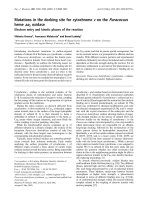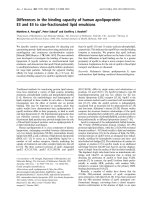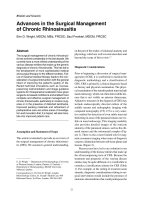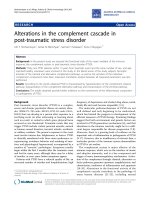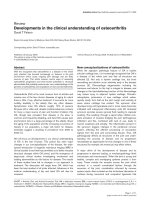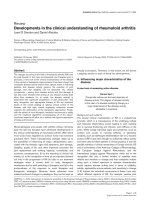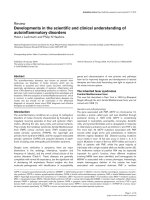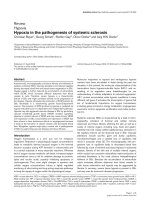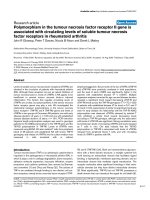Báo cáo y học: "Anemia in the ICU: are your patients needin’ erythropoetin" doc
Bạn đang xem bản rút gọn của tài liệu. Xem và tải ngay bản đầy đủ của tài liệu tại đây (120.74 KB, 2 trang )
Extended abstract
Citation
Corwin HL, Gettinger A, Fabian TC, May A, Pearl RG,
Heard S, An R, Bowers PJ, Burton P, Klausner MA, and
Corwin MJ, for the EPO Critical Care Trials Group:
Effi cacy and Safety of Epoetin Alfa in Critically Ill
Patients N Engl J Med 2007;357:965-76
Background
Anemia, which is common in the critically ill, is often
treated with red-cell transfusions which are associated
with poor clinical outcomes. We hypothesized that therapy
with recombinant human erythropoietin (epoetin alfa)
might reduce the need for red-cell transfusions.
Methods
Objective: Evaluate the effi cacy of epoetin alfa in reducing
the packed red blood cell transfusion requirement in
critically ill patients.
Design: Prospective, randomized, double blind, placebo
controlled, multi-center trial
Setting: 115 medical centers throughout the United States.
Subjects: 1460 patients that had been admitted to
medical, surgical, or trauma intensive care units. Inclu-
sion criteria included age 18 years or greater, patients
remained in the ICU for two days, and hemoglobin level
less than 12 gm/dl. Statistical analysis was performed for
the entire group, as well as subgroup analysis according
to the type of ICU to which the patient was admitted (the
subgroup analysis was included in the initial study
design).
Intervention: After enrollment, patients randomized to
the study group received epoetin alfa 40,000 units SQ on
study day 1, 8, and 15. e drug was withheld if the
hemoglobin level was greater than 12 gm/dl at the time
of scheduled administration. Patients randomized to the
placebo group received a placebo injection according to
the same schedule. All patients enrolled received supple-
mental iron. Patients were given packed red blood cell
transfusions at the discretion of the treating physician.
e investigators recommended goal hemo globin
concentration of 7 to 9 gm/dl, and not to transfuse for a
hemoglobin concentration of greater than 9 gm/dl unless
a specifi c indication was present.
Outcomes: e primary endpoint was percentage of
patients requiring blood transfusion. Secondary end-
points included number of units transfused, mortality,
and the change in hemoglobin concentration from baseline.
Results
As compared with the use of placebo, epoetin alfa
therapy did not result in a decrease in either the number
of patients who received a red-cell transfusion (relative
risk for the epoetin alfa group vs. the placebo group, 0.95;
95% confi dence interval [CI], 0.85 to 1.06) or the mean
(±SD) number of red-cell units transfused (4.5±4.6 units
in the epoetin alfa group and 4.3±4.8 units in the placebo
group, P = 0.42). However, the hemoglobin concentration
at day 29 increased more in the epoetin alfa group than in
the placebo group (1.6±2.0 g per deciliter vs. 1.2±1.8 g
per deciliter, P<0.001). Mortality tended to be lower at
day 29 among patients receiving epoetin alfa (adjusted
hazard ratio, 0.79; 95% CI, 0.56 to 1.10); this eff ect was
also seen in pre-specifi ed analyses in those with a
diagnosis of trauma (adjusted hazard ratio, 0.37; 95% CI,
0.19 to 0.72). A similar pattern was seen at day 140
(adjusted hazard ratio, 0.86; 95% CI, 0.65 to 1.13),
particularly in those with trauma (adjusted hazard ratio,
0.40; 95% CI, 0.23 to 0.69). As compared with placebo,
epoetin alfa was associated with a signifi cant increase in
the incidence of thrombotic events (hazard ratio, 1.41;
95% CI, 1.06 to 1.86).
Conclusions
e use of epoetin alfa does not reduce the incidence of
red-cell transfusion among critically ill patients, but it
may reduce mortality in patients with trauma. Treatment
with epoetin alfa is associated with an increase in the
© 2010 BioMed Central Ltd
Anemia in the ICU: are your patients needin’
erythropoetin?
David Hecht and Arthur Boujoukos*
University of Pittsburgh Department of Critical Care Medicine: Evidence-Based Medicine Journal Club, edited by Sachin Yende
JOURNAL CLUB CRITIQUE
*Correspondence:
Department of Critical Care Medicine, 612A Scaife Hall, 3550 Terrace Street,
University of Pittsburgh, Pittsburgh, PA 15261, USA
Hecht and Boujoukos Critical Care 2010, 14:332
/>© 2010 BioMed Central Ltd
incidence of thrombotic events. (ClinicalTrials.gov
number, NCT00091910.)
Commentary
Anemia is a common problem in critically ill patients,
frequently requiring packed red blood cell transfusion.
Transfusions are associated with potential complications
(hemolytic transfusion reactions, non-hemolytic transfu-
sion reactions, infectious disease transmissions). Previous
studies investigated the administration of human
recombinant erythropoietin to critically ill patients to
reduce transfusion requirements. e fi rst of these
studies demonstrated fewer transfusions with the
administration of erythropoietin, though there was no
diff erence in mortality.
1
A similar, larger study was
performed by many of the same researchers fi nding a
similar decrease in transfusion requirements in the
treatment group and no overall mortality diff erence.
2
Additionally, in a post hoc subgroup analysis, they
identifi ed a mortality benefi t in trauma patients.
e current article was performed in order to
investigate additional outcomes, primarily the safety of
epoetin alfa for this indication. e study design was
virtually the same as the 2002 study, although the current
study evaluates mortality benefi t at 140 days (an extended
time period from conventional 28-day mortality), and
predetermined subgroup analysis of medical, surgical,
and trauma ICU patients. It is interesting that the
fi ndings of this study do not refl ect the transfusion
benefi t previously demonstrated.
e current trial shows no diff erence in the PRBC
transfusion requirements, no clinically signifi cant diff er-
ence in hemoglobin concentration (though there is a
statistical diff erence), and no mortality benefi t. So, what
is the signifi cance of this study? e importance of this
study lies within the predetermined subgroup analysis. In
these analyses, mortality benefi t was observed in the
trauma patients, both at 29 days (hazard ratio [HR]=0.37,
CI:0.19 – 0.72) and at 140 days (HR=0.40, CI: 0.23 –
0.69). e mortality benefi t found in this data is not new.
Similar fi ndings were shown in the previous trial, where a
post hoc subgroup analysis was performed in trauma
patients and mortality benefi t was observed at 29 days
(HR=0.43, CI: 0.23 – 0.81). us, two large studies have
now shown a mortality benefi t. However, the causal
mechanisms are unclear. e benefi t does not correspond
to improvement in hemoglobin concentration or
reduction in transfusion requirement. e authors
speculate that it may be related to non-erythrogenic
properties of epoetin alfa, such as anti-apoptotic
characteristics or protection against hypoxemia.
e safety evaluation in this trial showed that epoetin
alfa increases the incidence of clinically relevant throm-
botic events (16.5 vs. 11.5, p = 0.008). ese fi ndings,
however, are not entirely conclusive. With further analysis,
the authors showed that the increase in throm botic events
only aff ected patients not receiving heparin prophylaxis.
e incidence of thrombotic events was 20.3 vs. 12.8
(p=0.008) in patients not receiving prophylaxis, and 12.3
vs. 10.2 (p=0.41) in patients receiving prophylaxis.
As with previous trials, this is a large, multi-center,
prospective, blinded, placebo-controlled trial. Why then
is the transfusion requirement benefi t not reproduced in
this study? is diff erence is likely related to a change in
transfusion culture. In 1999, the TRICC trial was
published, and this study showed that a restrictive
transfusion approach had similar outcomes compared to
liberal transfusion strategy.
3
Previous trials recruited
patients prior to these fi ndings, whereas the current
study recruited patients after dissemination of fi ndings of
the TRICC study. e lack of diff erences in transfusion
requirement in this study may have occurred due to less
aggressive transfusion practices.
With the current fi ndings, it is evident that epoetin alfa
administered to critically ill patients does not improve
transfusion requirements as previously demonstrated.
e mortality benefi t shown in trauma patients should be
considered, as this benefi t has been found independent of
transfusion requirement and hemoglobin concentrations
in two well designed trials. Mechanisms underlying this
benefi cial eff ect should be examined in future studies. It
is likely that epoetin alfa can be administered safely to
critically ill patients that are also receiving heparin in
prophylactic doses.
Recommendations
Epoetin alfa should not be used in critically ill patients to
decrease PRBC requirements. Epoetin alfa can be
considered in critically ill trauma patients as there is a
demonstrated mortality benefi t, but these patients should
be able to safely receive prophylactic heparin.
Competing interests
The authors declare that they have no competing interests.
Published: 17 December 2010
References
1. Corwin HL, Gettinger A, Rodriguez RM, Pearl GR, Guble KD, Enny C, Colton T,
Corwin MJ: E cacy of recombinant human erythropoietin in the critically
ill patient: A randomized, double-blind, placebo-controlled trial. Critical
Care Medicine 1999, 27: 2346-2350
2. Corwin HL, Gettinger A, Pearl GR, Fink MP, Levy MM, Shapiro MJ, Corwin MJ,
Colton TC: E cacy of Recombinant Human Erythropoietin in Critically Ill
Patients: A Randomized Controlled Trial. JAMA 2002, 288: 2827-2835
3. Herbert PC, Wells G, Blajchman MA, Marshall J, Martin C, Pagliarello G,
Tweeddale M, Schweitzer I, Yetiser E: A Multicenter, Randomized, Controlled
Clinical Trail of Transfusion Reuirements in the Critically Ill. NEJM 1999, 340:
409-417
doi:10.1186/cc9368
Cite this article as: Hecht D, Boujoukos A: Anemia in the ICU: are your
patients needin’ erythropoetin? Critical Care 2010, 14:332.
Hecht and Boujoukos Critical Care 2010, 14:332
/>Page 2 of 2
